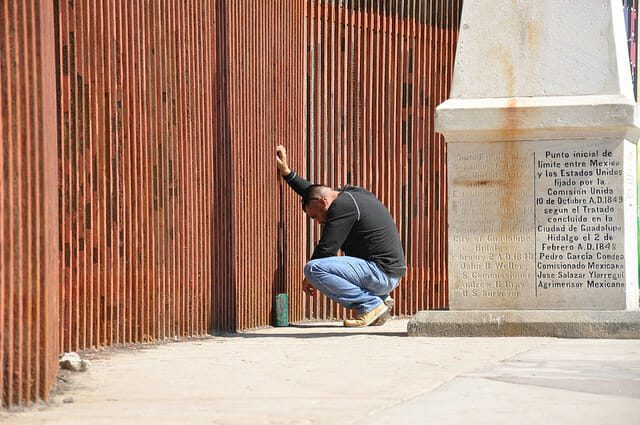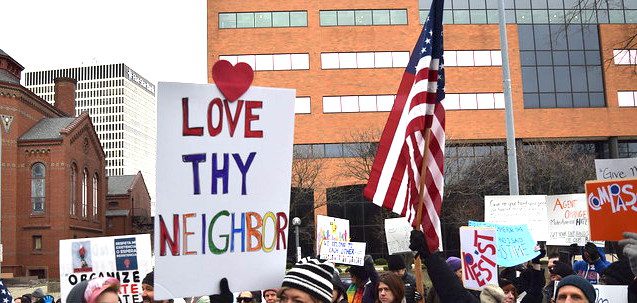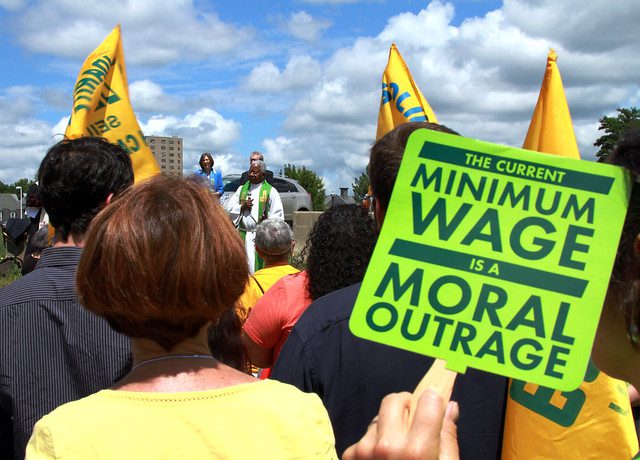
Photo by BBC World Service, CC BY-NC 2.0
While there is so much else going on, the family separation and family detention crisis at the border has occupied much of our attention this week, and we’re guessing much of yours as well. The crisis is not over, as children and parents remain separated and the administration pushes for indefinite family detention, which is, of course, not an acceptable solution either, especially not when alternatives exist that have a near perfect record of people showing for up their immigration court hearings. The administration is out of step with the vast majority of the American public on immigration, but that clearly hasn’t stopped them yet. Let’s not let relief that the most heinous practice might be stopped (in some instances) distract us from the fact that our country’s humanity hangs in the balance of how this is resolved.
Seattle gives in to bullying. Only a month after unanimously passing a “head tax” on very large corporations to fund affordable housing, the city council repealed it because those who would be taxed were gathering a war chest to put repeal on the ballot, calling it a “tax on jobs” and city officials feared they would lose. Not exactly inspiring leadership. Meanwhile, these are the situations when the true colors of companies like Amazon and Starbucks show. They are happy to reap accolades from some acts of charity here or there, but propose a systemic solution that would affect their ample bottom lines, and the claws come out.
Florida says its prison system is broke and is looking to cut expenses. Not surprisingly, those expenses include funding for treatment and transition programs, but they also include family visitation, which the system says it can no longer adequately staff. Their solution: contracting with private company JPay to sell video visitation to inmates and their families at a cost of $2.95 per minute (after a family purchases a video device for $80.) A group of families has vowed to boycott the company’s video system, as well as JPay’s inmate cash account program until in-person visitation is restored.
ArtPlace America has partnered with the University of Florida’s Center for Arts in Medicine (which is great to know exists in the first place) to launch a two-year initiative called “Creating Healthy Communities: Arts + Public Health in America.” The initiative began last month and its announcement says it will use cross-sector collaboration, research, translation, and resource sharing to build healthy communities in alignment with national public health goals. The collaboration will culminate with an evidence-based framework for public health practitioners to use in their work going forward.
Data Everywhere. ‘Tis the season for a fresh wave of data on the housing crisis. State of the Nation’s Housing (30th anniversary edition) from the Joint Center for Housing Studies gives a comprehensive picture on everything from homeownership to rent burden, and this year a look at what has changed, and what hasn’t, in 30 years. Out of Reach 2018, from the National Low Income Housing Coalition, continues its annual media-savvy calculation about where minimum wage workers can afford a two-bedroom apartment (nowhere) and the wage needed to do so. And HUD’s Policy Development and Research office has released its picture of subsidized households dataset, which includes demographic data for households helped by all HUD programs. Use them well, and combine with storytelling for best effect.
Brooklyn, New York, is unlike many American towns for many reasons, except one: increasing unaffordability. The New York State comptroller’s office recently released a report that was mixed. The good news: the borough is enjoying its lowest unemployment rate in nearly 30 years; the bad news: the employment gains were in low-wage health care and retail jobs—the average salary of which cannot afford rent in the borough. Over the past 10 years, Brooklyn’s average household income growth has not kept up with the average rent cost growth, which were 14 and 50 percent, respectively.
What have banks done for you lately? The Association for Neighborhood and Housing Development reminds us with its 8th annual review of the lending and reinvestment activities of banks in New York City, that in between CRA exams, local/regional advocates can play a part in holding banks of all sizes accountable for how well they serve their regions.
More than lofts. Adaptive reuse may call to mind turning old industrial spaces or school buildings in to artist live/work spaces, but a recent trend might take hold—motel conversions into affordable, and often supportive, housing. Though these projects aren’t simple, as CityLab reports, as reuse projects they make sense from a few different angles. (Read more about this in the Summer 2018 edition of Shelterforce magazine. It’ll be out soon!)
In Chicago, water rates have almost tripled over the past 10 years, and a new study from Enterprise shows affordable housing owners—who typically can’t pass on utility rate increases to tenants like market-rate owners can—can save money and strengthen the long-term viability of their properties. Using findings from a pilot program begun in 2016, the study includes key practical takeaways for housing providers as well as advocacy takeaways for funders and policymakers.
It’s not often that we feel moved to write about a product marketed to landlords. But unless we’re missing something (are we? Please tell us if so), it seems like TheGuarantors new security deposit replacement product could possibly be an actual market-based win-win. If landlords required a smaller deposit to cover an insurance premium instead of a full security deposit (which is, in essence, a blunt form of self-insurance), it could lower the barrier to renting an apartment for families with little savings, and also relieve the landlords of the complications of managing escrow accounts or facing damages a security deposit doesn’t cover. It just might work? (One thing to watch for is whether the product will be available with fair pricing for low-end as well as high-end rentals.)
Ever since David Rusk wrote Inside Game/Outside Game, it’s been assumed that one of the things frustrating the fortunes of Rust Belt cities is their inability to annex their surrounding tax base like Sun Belt cities often do, leaving core areas stuck with providing for the region’s highest needs without support from those who have decamped to fragmented and exclusionary suburban jurisdictions. Therefore it’s a little odd to see Memphis considering deannexation. It seems that some of the areas it wants to add are more burden than benefit, as the city is struggling to provide services. Even so, the city might not want to legitimize deannexation as a trend, given that wealthy border neighborhoods from Baton Rouge to parts of Georgia have been pushing the idea themselves specifically to create high-income enclaves where their taxes only support themselves—exactly the problem Rusk was describing.
A person who needs affordable housing is already waiting a long time—sometimes years—to get a voucher. (Of course that’s only if they actually make it on a wait list, many of which are closed.) A bill the House recently passed could make the situation even worse. The bill allocates thousands of housing vouchers to low-income people fighting addiction, and in essence, moves them to the front of the line. It would have made a lot more sense to create more housing vouchers instead.
LLCs, or limited liability companies, play a growing role in the U.S. housing market—and that’s not a good thing. “LLCs shield property owners from personal liability while obscuring their identities. In some cases, so much anonymity also enables money laundering and can mean that tenants struggle to hold landlords accountable, cities fail to fix blight, and researchers can’t answer basic questions about the housing market,” according to this New York Times article. About one-third of all rentals in the U.S. are owned by LLCs. Unfortunately, we only see the situation getting worse.
Airbnb will be taking a hit in Boston. The city council passed an ordinance that will create a short-term data collection system which the lodging site says will violate their hosts’ privacy. The ordinance also eliminates “investor units,” properties that owners rent but do not live in, among other restrictions. “It’s one of those things where not everyone is going to be completely pleased, but I did the best to try to get and find that middle ground,” said one Boston councilman.
This headline made us do a double take: Society could be more stable if there was more poverty. What a way to get us to read Vox’s chat with social psychologist Keith Payne, whose book The Broken Ladder argues, “when we’re reminded that we’re poorer or less powerful than others, we become less healthy, more angry, and more politically polarized.”




Comments